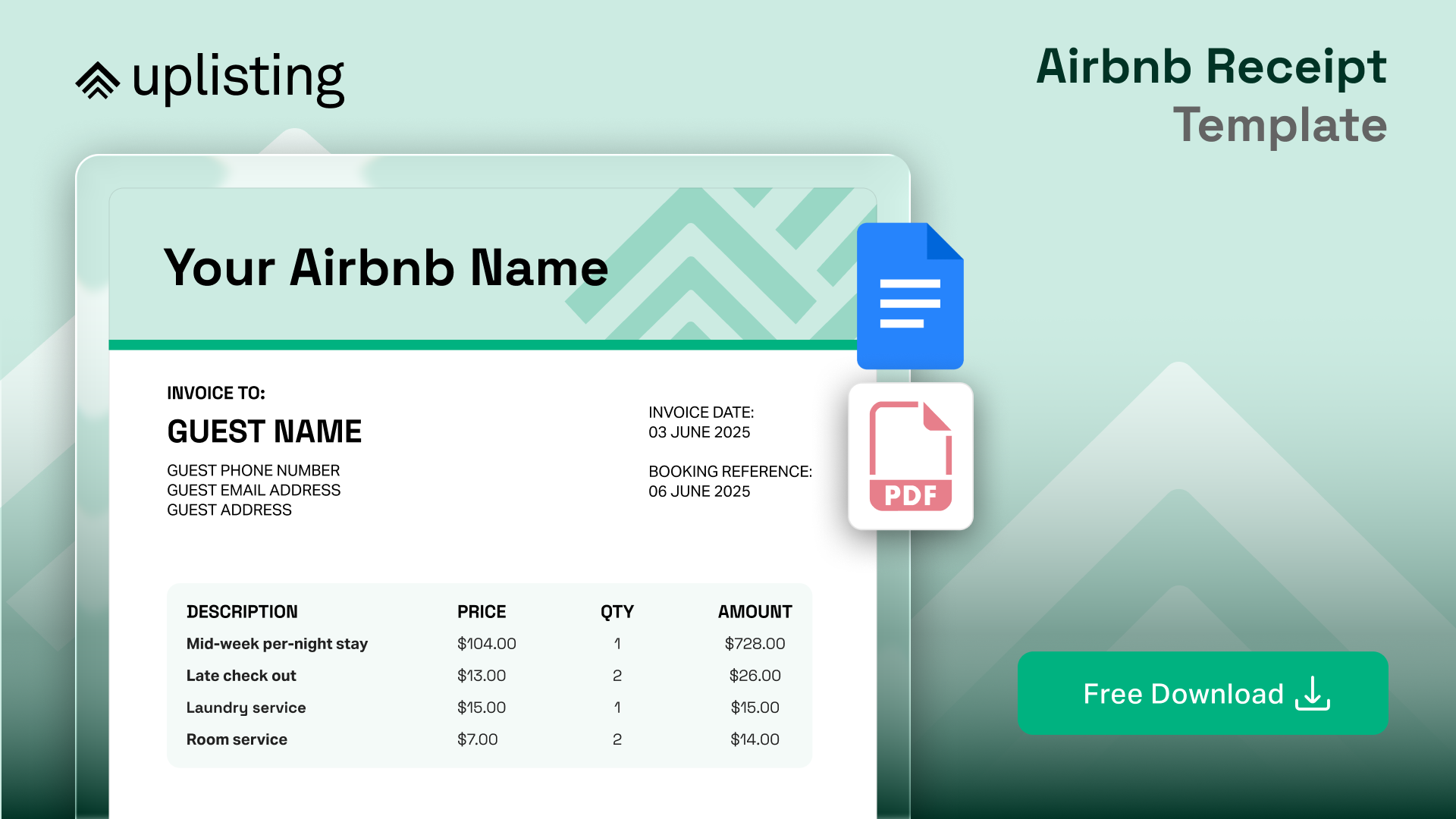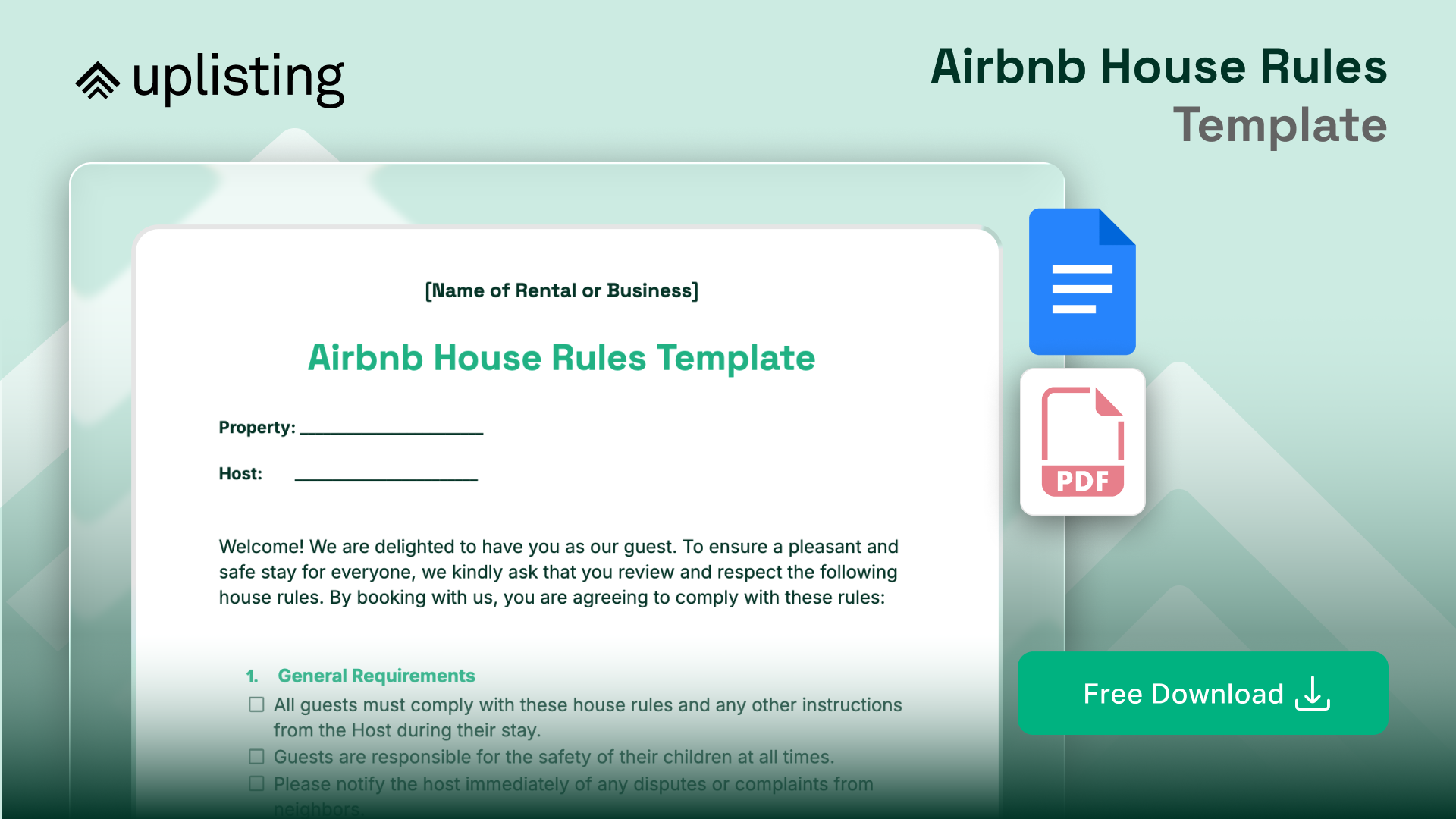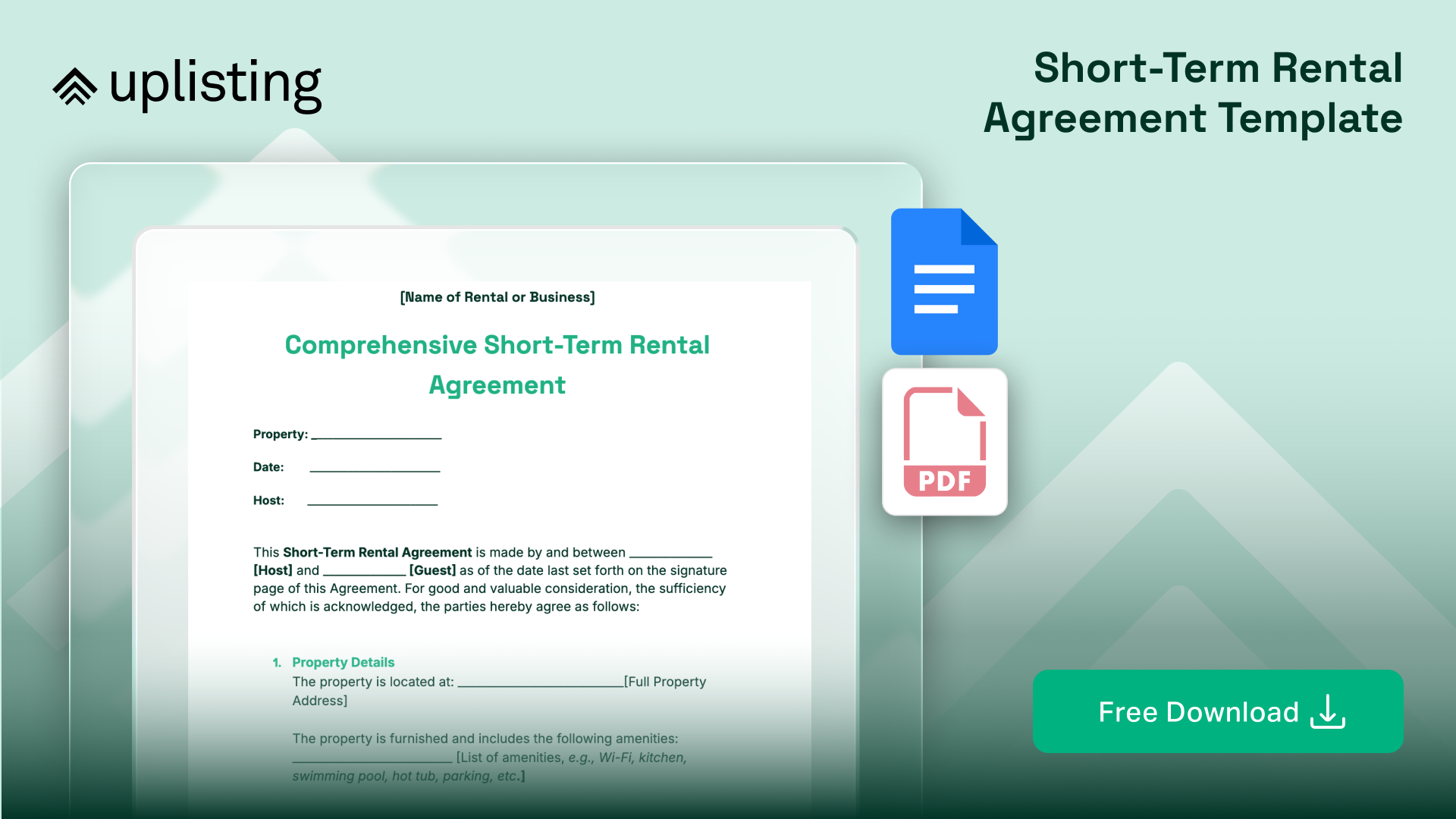Key Takeaways
Cleanliness complaints are tracked by Airbnb and impact your listing performance, so keep your vacation rental pristine.
Airbnb monitors listings for pricing transparency, so disclose all fees upfront to prevent guest complaints.
Airbnb won't protect you from local enforcement, so verify compliance with local regulations including permits, taxes, and guest documentation.
Running a short-term rental today is like navigating a maze where the walls silently shift overnight. What once was a straight path—keys handed over with a smile and a hope for five stars—has transformed into a complex labyrinth of compliance checkpoints. One wrong turn through Airbnb's host rules can mean the difference between glowing reviews lighting your way forward or hitting the dead end of a suspended account. The challenge? These pathways keep changing and their quiet remap requires you to stay on top of the most recent directions.
This guide strips away the guesswork. We’ll walk through the rules that matter most in 2025, from Airbnb’s baseline host requirements to the finer points of house rules and guest expectations. We’ve built this specifically for operators who need to navigate efficiently—those sprinting between turnovers, guest messages, and bookings with no time to wander aimlessly. Let’s make sure your properties are covered from day one.
Overview of Airbnb Requirements
Airbnb enforces host rules to protect the guest experience, reduce disputes, and ensure consistency across listings. Guidelines is a soft term for what are really non-negotiables that affect your visibility, ranking, and ability to earn as a host.
Meeting these requirements keeps your listing active and trustworthy. Missing them could lead to penalties like lowered search placement, suspension, or permanent removal. Common issues include failing to respond to guests, canceling confirmed bookings, or violating local laws.
Airbnb outlines the full list of expectations in its official host requirements. This includes core standards like timely responses, commitment to reservations, accurate listing details, and cleanliness. For new hosts, this checklist helps you hit the ground running with confidence. For existing operators, it’s a smart way to audit your current setup and avoid surprises.
Create 5-star guest experiences
Give your guests unforgettable experiences
With Uplisting, you can send the right messages at the right time on all booking sites. Read and respond to guest messages in a single, unified inbox — whether you’re at the office or on the go.
Must-Know House Rules for Hosts
While not explicitly required by Airbnb, house rules are a critical component of Airbnb's host requirements for maintaining quality standards and preventing disputes. They serve as your buffer against policy violations that could trigger Airbnb penalties. Clear house rules help prevent damage, set guest expectations, and protect against late-night complaints or refund requests that might lead to negative reviews or account flags. When rules are vague or missing, you're left cleaning up the mess, sometimes literally!
Start by being direct about noise, occupancy, and pets. If a property sits in a quiet neighborhood, say exactly what's allowed and when. "Quiet hours from 10 PM to 8 AM. No outdoor music." Not "Please be respectful." If the space sleeps four, don't accept six just because there's extra floor space. And if pets are allowed, define size or breed restrictions before someone shows up with three uncrated Great Danes.
Rules also need to match local laws to avoid fines or community pushback. Some cities limit guest capacity, require short-term rental permits, or ban pets altogether. If your policies conflict with city regulations , enforcement might come with a fine or a letter from the local council, not just a slap on the wrist from Airbnb.
Once policies are in place, make sure guests see them. Put rules in the listing, send them in a booking message, and include them in pre-arrival instructions. Use short sentences. Bold key points if needed. Guests won't read a novel, but they will skim. If rules aren't visible, don't expect them to be followed. Airbnb may side with guests in disputes where expectations weren't clearly communicated.
Listing accuracy
Listing accuracy is a core Airbnb host requirement. When guests book based on your photos and description, Airbnb expects that reality to match. If the photos show a private deck and the guest arrives to find shared space, expect a complaint or refund request. Airbnb actively monitors these discrepancies through guest feedback, and violations trigger penalties. Penalties can include delisting, held payouts, or a lower ranking in search results.
Photos need to reflect the current setup. Skip the fish-eye lens that makes a studio look like a two-bedroom. Don't show a hot tub that's been out of service for months. If the listing covers multiple units, label shared amenities clearly. Guests book based on what they see. If the property's changed, update the listing immediately to stay compliant with Airbnb's rules.
The calendar matters just as much. An open date means you're committing to host. Forgetting to block off personal use, renovations, or maintenance? Canceling later hurts your search ranking and puts your account at risk. Airbnb explicitly requires hosts to keep calendars accurate. If the listing says "available," you're expected to deliver, with very few exceptions under their hosting standards.
Cleanliness standards
Airbnb explicitly tracks cleanliness as a core host requirement. Their system flags properties with cleanliness complaints, directly impacting your listing's visibility and search ranking. Guests expect sanitized surfaces, fresh linens, and bathrooms that feel untouched. High-touch areas—light switches, remote controls, door handles—require thorough attention between stays or risk violation reports.
Create a documented cleaning protocol that meets Airbnb's standards. Build a room-by-room checklist and follow it religiously, especially during tight turnovers. Clean out the fridge, verify every lightbulb works, restock essentials, and complete a final inspection. Skipped steps disappoint guests and create compliance issues that Airbnb monitors through review patterns.
If you use a cleaning service, ensure they understand Airbnb's cleanliness requirements. A cleaner unfamiliar with platform standards puts your account at risk of penalties or suspension. Share detailed checklists, walkthrough videos, or before-and-after photo expectations. Airbnb's system doesn't distinguish between you or your cleaner. The platform only registers whether cleanliness standards were maintained or violated, which ultimately falls on you as the host.
Fee disclosures
Nobody likes surprise charges. Guests expect to see every cost upfront, whether it’s for cleaning, extra guests, or late checkouts. Airbnb separates mandatory fees from optional add-ons, but both need to be visible in the listing and confirmed before booking.
Transparent pricing prevents complaints. If the nightly rate is $200, but the guest sees $350 at checkout because of add-ons they didn’t expect, that frustration will show up in your reviews—or worse, in a dispute. Always break down the total so guests know exactly what they’re paying for.
Airbnb monitors fee-related complaints. If guests flag pricing confusion too often, your listing visibility can drop, or payouts may be delayed. Clarity builds trust. Overcomplicated pricing gives guests a reason not to come back. Keep it simple, list every fee, and make sure it matches what guests see before they book.

Legal Requirements and Local Regulations
Running a short-term rental means stepping into a legal maze that goes well beyond Airbnb’s terms. Zoning laws, tax rules, and city permits vary street by street—and local officials expect hosts to follow every detail. Airbnb rules for hosts only cover part of the picture. Local governments set the rest, and they don’t tolerate excuses.
Start with zoning. Some residential areas ban short-term rentals (STRs) altogether. Others allow them only with a special permit or if the host lives on-site. Before listing a property, check the address with your local planning office. If STRs aren't allowed, listing anyway risks fines, neighbor complaints, or notice to shut down operations.
Next up: taxes. Most cities and counties require hosts to collect and file occupancy taxes. Sometimes Airbnb handles the collection, sometimes it doesn’t. Either way, you're the one held accountable for accurate filings. Miss a deadline, and the tax office won’t wait to send a penalty notice. Keep detailed records of every booking, fee, and payout. Don’t rely on memory or screenshots when the auditor knocks.
Guest documentation
While Airbnb doesn't explicitly mandate ID verification for all listings, many jurisdictions—particularly across Europe—legally require hosts to collect and report guest identification to local authorities. Even where not legally required, verifying guest identity serves as critical protection against unauthorized parties, fraudulent bookings, and potential damage claims. Airbnb expects hosts to comply with these local regulations as part of their hosting standards.
When collecting identification, security is non-negotiable. Never screenshot passports or store ID images in unsecured cloud storage, email, or messaging apps. Instead, use purpose-built verification platforms like Uplisting that process documentation securely and delete sensitive data after verification. Remember that many jurisdictions have strict data protection laws governing how long you can retain guest information and how it must be stored.
Modern verification tools integrate seamlessly with your booking workflow, automating what was once a tedious process. These systems can request documentation directly through booking confirmations, verify identity before arrival, and maintain compliance records without manual intervention. This automation eliminates awkward check-in confrontations about missing documentation while creating an audit trail that protects you if Airbnb or local authorities ever question your compliance.
Insurance essentials
Homeowner’s insurance almost never covers short-term rentals. If a guest falls on the stairs or floods the bathroom, personal policies won’t help. You need coverage built for rentals. These policies explicitly name guests as temporary occupants, not friends crashing for the weekend.
Airbnb offers Host Liability Insurance and Host Damage Protection, but both come with fine print. The liability policy covers up to $1 million per incident, but denies claims for things like intentional damage or mold. Damage protection only pays out through the Resolution Center, and only if you submit photos, receipts, and messages showing what happened. Skip a step, and the claim may go nowhere.
A third-party policy fills in the blanks. Look for one that covers guest injuries, pet damage, missed income during repairs, and costs if a guest takes legal action. Some even cover pest treatments. Airbnb’s coverage helps, but it doesn’t catch everything.
When damage happens, move fast. Take photos before and after every stay. Save receipts for anything you repair or replace. Submit the claim through Airbnb first, but reach out to your insurer if needed. Delays and missing documentation make it harder to recover any losses.
Enjoy the confidence & focus you need to scale your vacation rental business
Book more while doing less
With a reliable VRM solution you can trust, Uplisting can help you grow your business without wasting time on double bookings, unhappy guests, upset clients and worrying what could go wrong next.
Penalties and Dispute Resolution
Airbnb doesn’t always flag a problem before stepping in. When hosts break rules—canceling last minute, misrepresenting listings, or allowing unauthorized subletting—the platform reacts quickly. You might lose search visibility, miss payouts, or find a listing suspended without warning.
The most common issues follow patterns. Canceling confirmed bookings, especially close to check-in, triggers warnings and eventually limits your account. Listing false amenities or approving more guests than your property can handle often leads to guest complaints. Safety concerns or poor cleanliness that gets flagged in reviews also raises red flags with Airbnb.
Airbnb may email a formal warning or remove a listing without discussion. In cases like third-party management, double-booking, or repeated complaints, accounts can be permanently removed. Even if guests leave positive reviews, consistent technical violations can still lead to penalties.
Appealing violations
Appealing a violation starts with providing proof. Airbnb won’t reverse a decision just because you disagree. Gather screenshots, time-stamped photos, guest messages, and anything else that shows your side clearly. For example, if Airbnb removed a listing due to a missing amenity, showing receipts or photos of the working item can help turn the decision around.
Structure your message to Airbnb support in a way that’s easy to follow. Start with a short explanation, add evidence, and stay direct. Long rants get ignored. Stick to the facts, include your corrective steps, and attach everything upfront.
Double-check your listing setup regularly to avoid future issues. Confirm your calendar is accurate, amenities listed match what’s in the space, and guest instructions are updated. If you work with a co-host or team, align on what’s being promised. Most violations come from simple miscommunication, not bad hosting.
Damage claims
When guests damage your property, the clock starts ticking. Airbnb gives hosts 14 days after checkout—or before the next guest arrives—to report any damage through the Resolution Center. Miss that window, and you lose your chance to file a claim.
Take photos before and after every stay. Focus on areas that get heavy use—furniture, bedding, electronics, flooring, bathrooms. Without proof of the original condition, Airbnb is unlikely to approve a claim. Make sure photos are clear, time-stamped, and labeled for easy reference.
To submit a claim, go through the Resolution Center with booking details, photos, a short description, and receipts or estimates for repairs. Airbnb may contact the guest, so keep your language neutral and focused. Avoid blaming guests directly, even if the issue is obvious.
Balancing property protection with guest trust takes a clear process. Set expectations in your listing, share rules before arrival, and inspect the space after each stay. Most guests respect your space, but a consistent routine helps you stay covered when someone doesn’t.
Understanding and following Airbnb’s 2025 hosting rules is essential for protecting your business, keeping your listings live, and delivering consistent guest experiences. From maintaining accurate listings and setting clear house rules to complying with local regulations and handling disputes, every detail matters. At the very least, Sstaying ahead of these requirements helps you avoid penalties. On a larger scale, it''s a smart strategy for scaling your short-term rental business with confidence.
Ready to simplify your operations and stay in control of every detail? Sign up for Uplisting to streamline your vacation rental management.
FAQs About Airbnb Rules for Hosts
Does Airbnb require a minimum level of cleanliness?
Yes. Airbnb expects hosts to keep properties consistently clean and guest-ready. Surfaces need to be wiped down, linens should be freshly laundered, and bathrooms must look and feel sanitary. Guests won’t care how fast the turnover was. They’ll notice if the shower has hair in the drain or if the fridge smells.
The COVID-era Enhanced Cleaning Protocol is no longer mandatory, but guest expectations haven’t lowered. Airbnb still monitors reviews for cleanliness issues, and repeated complaints can hurt listing visibility or even lead to removal.
How many cancellations lead to penalties?
Even one canceled reservation can trigger a penalty, especially if it happens close to check-in. Airbnb tracks cancellation frequency, and multiple incidents—regardless of spacing—can lead to calendar blocks, reduced payouts, or listing suspension.
Accurate calendars and clear communication reduce the risk. If plans change or maintenance gets in the way, block the dates immediately. Guests expect reliability, not last-minute surprises.
Are hosts responsible for local tax collection?
It depends on the city or state. Airbnb handles occupancy tax collection in some areas, but not everywhere. Where Airbnb doesn’t step in, you’re expected to charge, report, and remit taxes directly to local agencies.
Tax laws vary widely—even within the same state—so check with your local short-term rental office or city hall. Airbnb rules for hosts don’t replace local requirements, and tax authorities won’t accept confusion as an excuse for missing payments.
What happens if a guest breaks the house rules?
If a guest ignores house rules—throws a party, brings extra people, or smokes indoors—you can report the issue to Airbnb and submit photos, messages, or other proof through the Resolution Center. Airbnb reviews the case and may offer partial reimbursement, remove the guest, or cover damage, depending on the situation.
Clear rules and solid documentation help your case. Vague policies or missing evidence slow down the process. Make sure the rules are in the listing, in your messages, and visible in the property, so there’s no room for confusion.


















.png)

